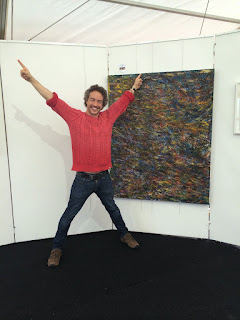I was 31 in 2011. It was a watershed year for me in terms of assessing what was important. I dived into a “Project Mojo” to get myself back on track. I was living in London and started renting a lock and go studio at Wimbledon Art Studios. When I chose what to study, it had been a very pragmatic acceptance of the idea that, “Not all good ideas are good business ideas”. I loved art and maths, but it was more likely that I could monetize maths/business than art. I kept up at least one painting a year, but that was all I got round to. I had always prioritized later, but decided I need to bring some of that prioritizing into fruition.
Every Saturday and Sunday, I would head to my studio for a couple of hours. I specifically chose to spend the year focusing on abstract expressionism. Trying to turn my mind off and focus on automatic, glutral painting, that came from somewhere else in me. Color and texture. Layers and energy. What makes you an artist? Renting a studio? Selling a painting? Believing you are one? Making a living from painting. I have always loved art. My mother was an art teacher, and I did take it as a Matric subject. Turning creativity, directly and conspicuously, into a career is something I considered… but always felt like a path with lots of resistance. These two or three hours, twice a weekend, had none of that baggage. It wasn’t for anyone else.
Wimbledon Art Studios has two open studios each year. Most of the artists clean up their studio and turn it into a gallery. There is a huge range and plenty of deals on offer. It was also very humbling for me, as you sit for hours with people poking their head in and making snap judgements of whether it is worth coming in. I did sell a few… but certainly nowhere in the range of convincing myself that this is a better career option than Asset Management. Art remained something “for me”. Not something that I would bend and twist into the mould required for paying the bills.
We all need to pay the bills. Even South Africa has to figure out a way towards economic prosperity if it wants to have these indulgent “finding yourself” years I was able to afford. Sometimes you do what you want to do. Sometimes you do what you have to.











